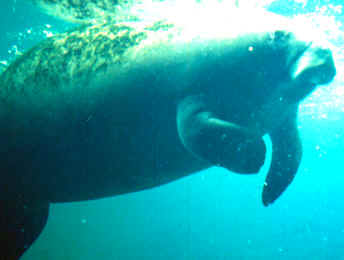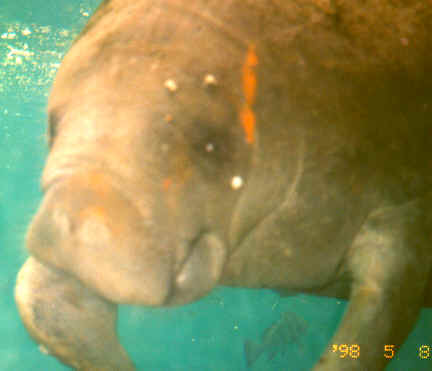
Physical Description: The west Indian manatee is a large, gray-brown, aquatic mammal with a body that tapers to a flat, paddle-shaped tail. It has two flippers with 3 to 4 nails on each, and it's head and face are wrinkled, with whiskers on the snout. The manatee's closest relative is the Elephant. Manatees' are believed to have evolved from a wading plant-eating animal. The West Indian manatee is related to the West African manatee, the Amazonian manatee, the dugong and the Stellar's sea cow, which was hunted to extinction in 1768. The average adult manatee is about 10 feet long and weighs about 1,000 pounds.
Habitat and Range: Manatees' can be found in shallow, slow moving rivers, estuaries, saltwater bays, canals and coastal areas. The manatee is a migratory species. Within the United States, they are concentrated in Florida in the winter, but can be found in summer months as far west as Alabama and as far north as Virginia and the Carolinas. The West Indian manatee can also be found in the coastal and inland waterways of Central America and along the northern coast of South America, although distribution in these areas may be spotty.
Behavior: Manatees are gentle and slow-moving. Most of their time is spent eating, resting and in travel. Manatees are completely herbivorous. They eat aquatic plants and can consume 10-15% of their body weight daily. They graze for food along water bottoms and on the surface. They may rest submerged for at the bottom or just below the surface, coming up to breathe on the average of every three to five minutes. When the manatee is using a great deal of energy, it may surface to breathe as often as every 30 seconds.
Lifespan, Mortality, Population: The manatee has no natural enemies and it is believed they can live 60 years or more. Many manatee mortalities are human related. Most human related manatee mortalities occur from collisions with watercraft. Other causes of human related mortalities include being crushed and/or drowned in canal locks and flood control structures; ingestion of fish hooks, litter and monofilament line; entanglement in crab trap lines; and vandalism. Ultimately, however, loss of habitat is the most serious threat facing the manatee today. There are approximately 1,800 West Indian manatees left in the United States.
Breeding and Reproduction: The reproductive rate for manatees is slow. Female manatees are not sexually mature until five to nice years old, and males are mature at approximately nice years of age. It is believed that one calf is born every two to five years; twins are rare. The gestation period is approximately 13 months. Mothers nurse their young for a long period and a calf may remain dependent on its mother for up to two years.
Legal Protection: The manatee is protected under federal law by the Marine Mammal Protection Act of 1972 and the Endangered Specials Act of 1973, which make it illegal to harass, hunt, capture or kill any marine mammal. The manatee is also protected by the Florida Manatee Sanctuary Act of 1978, which states: "It is unlawful for any person, at any time, intentionally or negligently, to annoy, molest, harass or disturb any manatee." Anyone convicted of violating Florida's state law faces a possible maximum fine of $1,000 and/or imprisonment for up to 60 days. Conviction on the federal level is punishable by a fine of up to $100,000 and/or one year in prison.
Conservation: The Manatee Recovery Plan was developed as a result of the Endangered Species Act. The recovery plan was coordinated by the U.S. Fish and Wildlife Service and sets forth a list of tasks geared toward recovering the manatee from it's current endangered status.
Other conservation measures deemed important to saving the manatee include: public acquisition of critical habitat and creation of sanctuaries; research covering the biology, mortality, behavior, habitat and population of the manatee; implementation of management plans; posting of regulatory speed signs and levying of fines for excess speeds in designated areas; and manatee education and public awareness programs.
The Florida Marine Patrol has a manatee hot line number available for reporting injured, dead, harassed, tagged or orphaned manatees.
CALL 1-800-DIAL-FMP
Last updated: January 11, 2004

